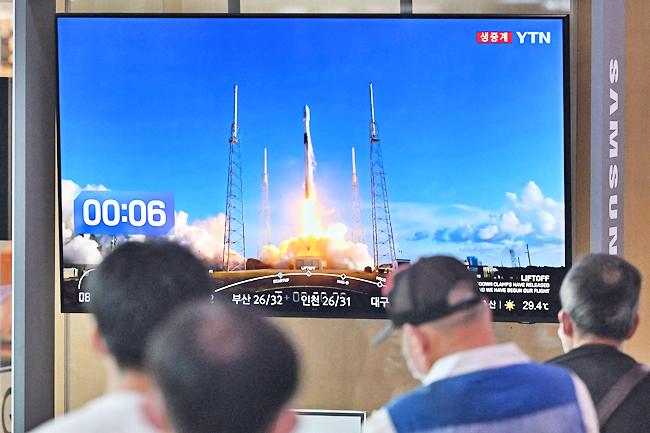SEOUL (AFP) – South Korea’s first lunar orbiter successfully launched on a year-long mission to observe the Moon, Seoul said yesterday, with the payload including a new disruption-tolerant network for sending data from space.
‘Danuri’ – a portmanteau of the Korean words for “Moon” and “enjoy” – was on a Falcon 9 rocket launched from Cape Canaveral in Florida by Elon Musk’s aerospace company SpaceX. It aims to reach the Moon by mid-December.
“South Korea’s first lunar orbiter ‘Danuri’ left for space at 8.08am on August 5, 2022,” Seoul’s Science Ministry said in a tweet, sharing a video of the rocket blasting off trailing a huge column of smoke and flames.
Danuri “successfully entered orbit towards the moon”, Seoul’s Vice Science Minister Oh Tae-seok told reporters yesterday, saying that researchers were already communicating with Danuri through NASA’s deep-space antenna in Canberra, Australia.
“Analysis of the received satellite information confirmed that Danuri’s solar panel was properly unfolded to start power generation,” he said, adding everything appeared to be going smoothly. Danuri will use six different instruments, including a highly sensitive camera provided by NASA, to conduct research, including investigating the lunar surface to identify potential landing sites.

One of the instruments will evaluate disruption-tolerant, network-based space communications, which, according to South Korea’s science ministry, is a world first.
Danuri will also try to develop a wireless Internet environment to link satellites or exploration spacecraft, Seoul has said. The lunar orbiter will stream K-pop sensation BTS’ song Dynamite to test the wireless network.
Scientists also hope Danuri will find hidden sources of water and ice in areas of the Moon, including the permanently dark and cold regions near the poles.
“This is a very significant milestone in the history of Korean space exploration,” said Head of the Korea Aerospace Research Institute Lee Sang-ryool in a video shown before the launch.
“Danuri is just the beginning, and if we are more determined and committed to technology development for space travel, we will be able to reach Mars, asteroids, and so on in the near future.”
South Korean scientists said Danuri – which took seven years to build – will pave the way for the nation’s more ambitious goal of landing on the Moon in the next decade.
“South Korea will become the seventh country in the world to have launched an unmanned probe to the Moon,” an official at the Korea Aerospace Research Institute told AFP.
“We hope to continue contributing to the global understanding of the Moon with what Danuri is set to find out.”






